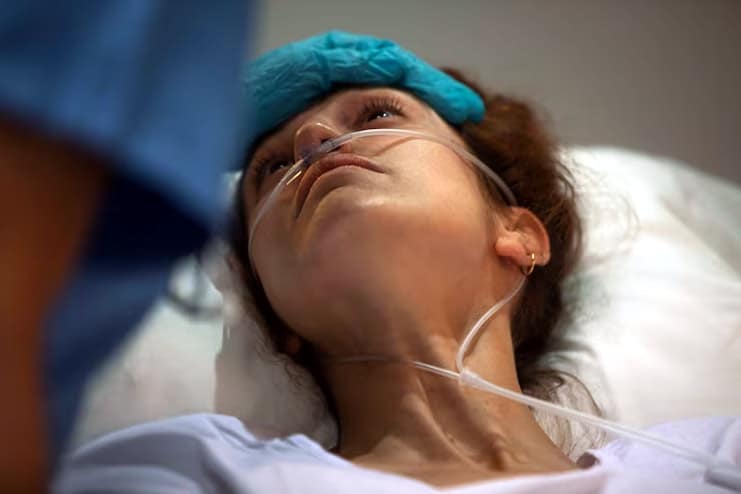Affiliate Disclaimer
Some links in this article are affiliate links. We may earn a small commission if you make a purchase through these links, at no extra cost to you. We only recommend products we find useful to our readersSleep is an essential component of human health that goes beyond its roles in renewal and mental clarity. This article explores sleep’s vital role in our body’s capacity to prevent and treat cancer, revealing the scientific relationships between sleep quality, cancer risks, and cancer prevention and management techniques.
Studying the complex association between sleep and cancer reveals that sleep patterns affect the immune system and control vital biological functions. The balance of these functions is essential to preventing cancer and aiding in healing those afflicted. Understanding the significant effects of sleep on the body’s defenses against malignant threats is critical.
Understanding the Link Between Sleep and Cancer

Given that sleep cycles and circadian rhythms significantly impact the immune system and cellular control of the body, understanding the complex relationship between sleep and cancer requires a thorough understanding of the scientific details surrounding these rhythms.
Sleep is a dynamic process with multiple stages supporting different bodily processes. The body’s internal clock, the circadian rhythm, synchronizes these phases and controls vital functions for general well-being.
Recent studies have clarified the relationship between irregular sleep cycles, melatonin synthesis, and the initiation, spread, and prognosis of cancer.
The hormone melatonin, released when you sleep, has potent anti-inflammatory and antioxidant qualities that help the body fight malignant cells. Sleep disturbances can prevent the body from producing enough melatonin, which could weaken the body’s defenses against cancer.
Furthermore, irregular sleep patterns impact several genes involved in immune response and tumor suppression. These genes must maintain a precise balance to stop malignant cells from growing out of control and build a robust immune system. The expression of these genes may change in response to sleep disturbances, which could impact the body’s capacity to prevent cancer and react appropriately when malignant cells are present.
Knowledge of the underlying biological processes sheds light on the connection between cancer and sleep. Sleep disturbances have a dual effect on melatonin levels and genetic expressions, which together foster an environment that is favorable to the onset and spread of cancer.
Understanding these underlying relationships creates opportunities for the development of focused therapies that enhance sleep quality and strengthen the body’s natural defenses against cancer’s intricacies. The need to prioritize healthy sleep habits in the context of cancer prevention and recovery becomes more apparent as we work through these scientific complexities.
Next Article: What Sleeping Position Says about Your Personality
Importance of Quality Sleep in Cancer Prevention

The value of getting enough sleep in our hectic modern life cannot be over-emphasized, especially in light of its significant benefits for cancer prevention. Several lifestyle factors have been linked to the increased risk of cancer, including shift work, sleep deprivation, and sleep disorders.
Shift employment, which frequently entails irregular nighttime hours, disturbs the body’s circadian rhythm. This disruption may result from reduced production of melatonin, a hormone with antioxidant and possibly anti-cancer properties.
In a world where people are constantly on the move, sleep deprivation not only impairs cognitive performance but also impairs the immune system’s capacity to identify and eradicate aberrant cells, increasing the body’s vulnerability to cancer.
These risks are further increased by sleep disorders, which can range from insomnia to sleep apnea. These conditions throw off the body’s normal sleep cycle, making it more challenging to go through necessary processes critical to general health. Given that these lifestyle factors influence cancer susceptibility, it is clear that addressing them is an essential component of an all-encompassing cancer prevention plan.
Regular, high-quality sleep is essential for bolstering the body’s anti-cancer defenses. The immune system strengthens as we sleep, effectively recognizing and eliminating threats, including malignant cells. Good sleep also aids in lowering inflammation, which is recognized as a trigger for the onset of cancer. Furthermore, sleep’s restorative qualities aid in the complex process of DNA repair, averting genetic alterations that may trigger the start and spread of cancer.
Essentially, developing sound sleep patterns can be a powerful tool in the fight against cancer. Understanding sleep as a top priority in cancer prevention becomes critical for fostering a proactive and all-encompassing approach to health as individuals, communities, and healthcare providers.
Next Article: Sleep Solutions for Everyone: Family Friendly Tips for Better Rest
Sleep Strategies for Cancer Recovery

Cancer patients may experience physical and psychological side effects from their treatment, which frequently affects how well they sleep. For cancer patients, adopting precise sleep hygiene practices, using evidence-based sleep techniques, and realizing the significance of restorative sleep in the healing process become critical.
Here, we examine various approaches designed to address each patient’s particular requirements and difficulties during cancer treatment and recovery.
Make environmental changes to provide cancer patients with a comfortable sleeping environment. Keep the room’s temperature comfortable, reduce noise, and dim lights to create a more peaceful environment. Purchase supportive pillows and a mattress to improve physical comfort and promote a more peaceful night’s sleep.
Add relaxation methods into everyday routines to enhance the quality of your sleep while recovering from cancer. Before going to bed, practice mindfulness meditation, deep breathing techniques, and light stretching to reduce tension and create a tranquil atmosphere that will improve your sleep quality. These exercises support mental health and physical relaxation, both essential components of the healing process.
Considering the disturbances created by treatment schedules and possible side effects, cancer patients must modify their sleep practices. Maintain a regular sleep-wake pattern to control the body’s internal clock, even during therapy sessions and doctor’s visits. Establish a nightly routine, like reading or relaxing music, to signal the body it’s time to relax and sleep.
Healthcare professionals are essential when it comes to helping cancer patients with sleep problems. Providing advice on how to handle fatigue, sleeplessness, and other sleep disruptions frequently seen during cancer therapy becomes necessary for patients’ overall care. Medical experts can offer workable options by customizing treatments to meet each patient’s unique needs, like suggesting cognitive-behavioral therapy for insomnia (CBT-I) or writing prescriptions for sleep aids as necessary.
A comprehensive strategy for managing sleep during cancer recovery combines habitual sleep alterations, environmental adaptations, and relaxing strategies. Healthcare professionals, who are essential allies in this path, can provide individualized advice to lessen sleep-related issues.
By equipping cancer patients with practical sleep techniques, we hope to improve their general health and facilitate a quicker recovery.
Conclusion

It is impossible to overestimate the complex relationship between cancer prevention and sound sleep habits. Research highlights the critical function of good sleep in supporting the body’s defensive mechanisms against cancer, highlighting the significance of prioritizing sleep in one’s lifestyle.
Getting regular, restorative sleep is becoming increasingly important as we negotiate the challenges of modern life. It can help reduce the risk of cancer and promote general well-being. It encourages readers to acknowledge sleep’s significant influence on their health and to take proactive measures to develop sound sleeping practices.
Setting a high priority for good sleep is essential to a holistic approach to well-being; it is not just a luxury. Getting help from medical specialists is critical for cancer patients dealing with sleep-related issues. When we all recognize the value of getting enough sleep, we allow ourselves to control our health and positively impact the future.
Other Recommended Articles on Sleep
- What Happens If you Sleep 6 Hours a Day? Know the Side Effects
- What Happens If you Don’t Sleep for Days
Reference
https://www.ncbi.nlm.nih.gov/pmc/articles/PMC7030790/#:~:text=Circadian%20rhythms%20and%20sleep%20are,organisms%20more%20vulnerable%20to%20disease.
https://www.ninds.nih.gov/health-information/public-education/brain-basics/brain-basics-understanding-sleep
https://www.ncbi.nlm.nih.gov/books/NBK519507/
https://www.hopkinsmedicine.org/health/wellness-and-prevention/lack-of-sleep-and-cancer-is-there-a-connection
https://www.ncbi.nlm.nih.gov/pmc/articles/PMC7324664/
https://www.sleepfoundation.org/physical-health/cancer-and-sleep
https://www.dana-farber.org/health-library/tips-for-managing-insomnia-during-cancer-treatment
https://cancercenterforhealing.com/role-of-sleep-in-cancer-recovery/
https://www.cdc.gov/sleep/about_sleep/sleep_hygiene.html#:~:text=Make%20sure%20your%20bedroom%20is,Get%20some%20exercise.
https://www.ncbi.nlm.nih.gov/pmc/articles/PMC4400203/
In this Article


















